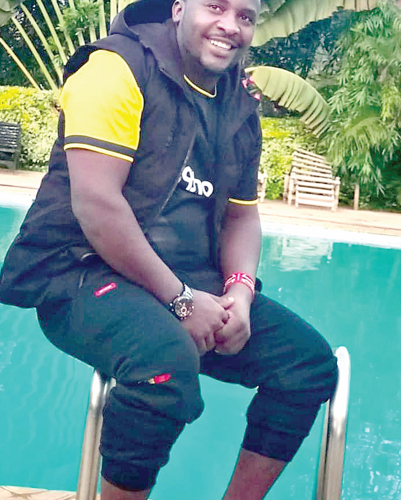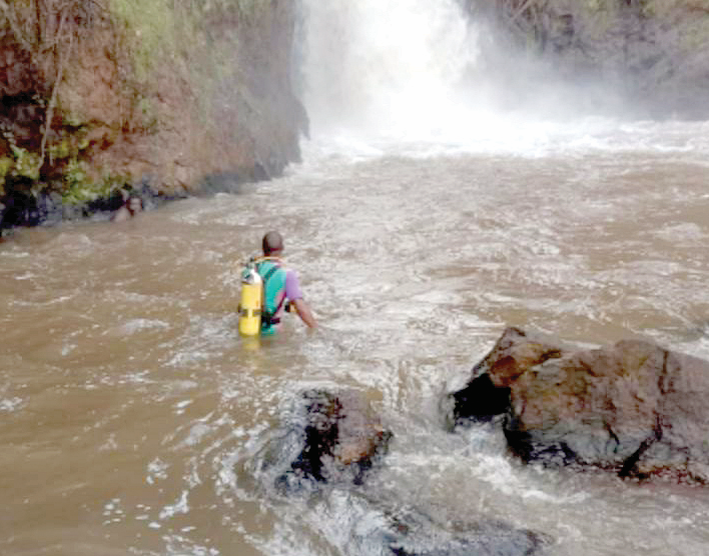In the business of retrieving dead bodies from rivers
By Wangari.Njuguna, November 28, 2023Growing up, David Murathi loved swimming in the nearby Mathioya River, which is a stone’s throw away from his home. He always got into trouble with his mother who would give him a thorough beating, warning him against going to the river to swim, but he would hear none of it.
On several occasions, he saw his peers drown in the river, but this never dampened his spirit of swimming. Instead he decided to perfect his swimming skills. His mission was to become a diver.
“Five boys who were my friends drowned in the river, but by then I was too young to save them,” Murathi recalls.
It took him years to master the skill of maneuvering along the rivers even when the waters raged. He recalls his first recovery mission of a student from a local school, who drowned in the same Mathioya River and efforts by the residents to save him or even retrieve the body later were futile. Murathi recovered the body after a few hours.
On many occassions, he has helped retrieve bodies of students from Murang’a University of Technology, from river Mathioya. Many of these students visit the river for photoshoot or just adventure
He says there were no trained divers in the area. Being a good swimmer, he recruited a few of his friends who formed a team.
Bravery and determination
Murathi claims the county government has no divers and when need arises, they previously had to get help from Nanyuki or Nairobi. He says his team members could not go for professional training because they lacked a clearance certificate from secondary school, a minimum requirement by the Ministry of Defense, which had offered to train them. They have, however, been trained on disaster management to help respond to the incidents.
It takes bravery and determination to do this kind of work. It requires tactical skills to get to every corner of the river to look for bodies. However, the biggest challenge was to train the team how to handle dead bodies once they spot them under the water.
“At first it was a bit scary for them because they had not handled bodies before, but as time went by, they got used to it,” said Murathi. The typical decomposition changes proceed more slowly in the water, primarily due to cooler temperatures and the anaerobic environment.
One of the most challenging tasks was in June 2020, when he was tasked to retrieve two cousins who drowned in Rupingazi River in Embu County, which is said to be the fastest flowing river in the country. The boys had been in the water for five days before he was called to help in retrieving them. It took Murathi and his team eight hours to retrieve the bodies and this is the longest they have ever taken to get a body out of the water.

He admits the missions are not a walk in the park as some rivers are infested with dangerous animals such as crocodiles and hippos. “Our mission is to retrieve the bodies and we don’t back off until it’s done,” he says.
Some rivers can also be challenging to navigate as some spots are very deep, yet they have to comb everywhere until they recover a body.
“We always start our mission with a prayer for it to be successful, but it also requires good coordination and communication to make work easier,” Murathi notes.
“We each agree on which part of the river or dam to cover and we don’t get out of the water until we retrieve the body or it gets dark,” he adds.
He, however, says if they get to the river and any of his team members feels that his instincts do not allow him to get into the water, the person stays by the river banks until the mission is complete.
Various challenges
He says retrieving the bodies has been a source of livelihood for him and the teammates. Murathi says he prefers to deal with the government rather than the families, saying the latter may not be able to honour the pay agreement after getting the body. In addition, the family is in distress over the loss of their loved one and it may not look good when one goes to demand for payment.
“In instances where the family calls for help we must negotiate the price before we start the mission, but the charges vary. The cost can go up to Sh200,000,” he shares.
Lack of equipment such as safety gears is one of the challenges they face in line of duty. He calls upon the government and any well-wishers to help purchase the equipment for them.
Majority of the victims drown while on adventure and mostly when the rivers are not swollen because they underestimate water in such times.
“Most people drown when the rivers have low water volumes and they go for swimming expeditions, but when it rains, everyone is careful because the rivers are full. However, accidents do happen all the time, even when one takes precautions as had been witnessed during this season,” he notes.
He says they go to retrieve the body as the final option because ideally it should float 72 hours after one drowns. Some, are however, trapped under rocks or stuck in mud and that’s where they come in.
To date Murathi and his team have retrieved about 20 bodies.
